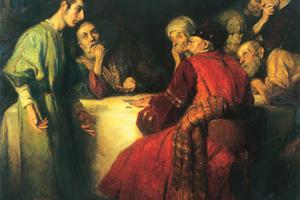The Holy Week Shadows of St. Joseph: Good Friday
The sixth of several reflections on St. Joseph by Father Raymond de Souza for your Holy Week contemplations.

In his apostolic letter for the beginning of the Year of St. Joseph, Pope Francis cites Polish author Jan Dobraczyński. The Holy Father explains that his novel, The Shadow of the Father, “uses the evocative image of a shadow to define Joseph. In his relationship to Jesus, Joseph was the earthly shadow of the heavenly Father: he watched over him and protected him, never leaving him to go his own way.” (Patris Corde 7)
Nevertheless, Joseph is not present in the Lord’s public life. Yet we might find St. Joseph during Holy Week, if we allow ourselves to imagine where his “shadow” may have fell upon Jesus in those most sacred days.
At noon darkness came over the whole land until three in the afternoon. And at three o’clock Jesus cried out in a loud voice, “Eloi, Eloi, lema sabachthani?” which is translated, “My God, my God, why have you forsaken me?” Some of the bystanders who heard it said, “Look, he is calling Elijah.” One of them ran, soaked a sponge with wine, put it on a reed and gave it to him to drink saying, “Wait, let us see if Elijah comes to take him down.” Jesus gave a loud cry and breathed his last (Mark 15:33-37).
Jesus cries out to His Father, and it is a cry that, despite its familiarity, has not lost its power to tear at our hearts. The Son of God is crying out. Has He been abandoned by the Father?
As we imagine where the shadows of St. Joseph might fall during Holy Week, the cry from the Cross is one such place. The cry of Jesus is the first line of Psalm 22; Jesus is praying the Psalms on the Cross.
Those who are dying, even if they have not spoken for days, or made any motion, are sometimes able to move their lips or make the sign of the Cross when the priest comes for a final anointing. The prayers learned in childhood endure even when all else is stripped away.
Joseph would have taught Jesus the Psalms, the prayer book of the Jewish people. We tend to think about Joseph providing Jesus with a trade, teaching him how to be a carpenter, an artisan. Yet the more fundamental duty of Joseph would have been religious formation, fathers teaching their sons how to pray, how to worship God rightly. We know that Joseph and Mary went every year on pilgrimage to Jerusalem for Passover; Jesus would have learned the pilgrimage to the holy city from them.
There are magnificent stained glass windows in St. Mary’s Cathedral in Kingston, Ontario, which show the Holy Family together in Nazareth. There is one of Jesus is Joseph’s workshop, but the more important one is of Jesus and Mary together — their tools of work laid aside — as Joseph leads them in prayer, as he teaches Jesus the prayers of His people, primary among them the Psalms.

Psalm 22 summarizes what is happening on the Cross. Jesus prays the first line. The Psalm continues to describe the crucifixion in agonizing detail (14-18):
I am poured out like water, and all my bones are out of joint; my heart is like wax, it is melted within my breast;
my strength is dried up like a potsherd, and my tongue cleaves to my jaws; thou dost lay me in the dust of death.
Yea, dogs are round about me; a company of evildoers encircle me; they have pierced my hands and feet — I can count all my bones — they stare and gloat over me;
they divide my garments among them, and for my raiment they cast lots.
As Jesus prays, the prophecies are being fulfilled. Despite the horror of the Cross, the glory of God has the final word (27-31):
All the ends of the earth shall remember and turn to the LORD; and all the families of the nations shall worship before him.
For dominion belongs to the LORD, and he rules over the nations.
Yea, to him shall all the proud of the earth bow down; before him shall bow all who go down to the dust, and he who cannot keep himself alive.
Posterity shall serve him; men shall tell of the Lord to the coming generation, and proclaim his deliverance to a people yet unborn, that he has wrought it.
- Keywords:
- holy week 2021
- good friday
- passion of christ

















